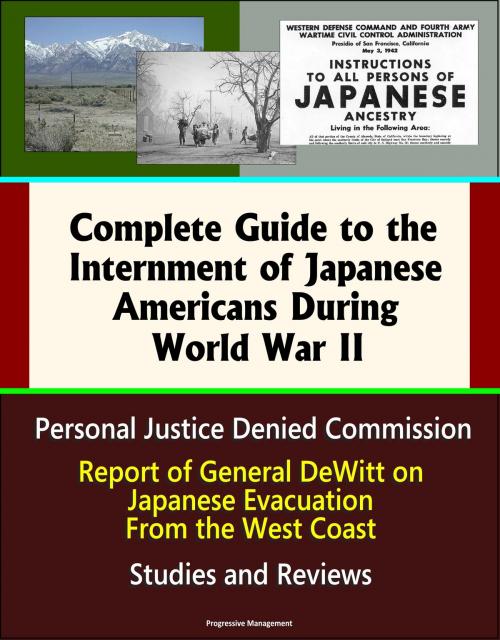Complete Guide to the Internment of Japanese Americans During World War II: Personal Justice Denied Commission, Report of General DeWitt on Japanese Evacuation From the West Coast, Studies and Reviews
Nonfiction, History, Asian, Japan, Military, World War II| Author: | Progressive Management | ISBN: | 9781311656056 |
| Publisher: | Progressive Management | Publication: | December 2, 2015 |
| Imprint: | Smashwords Edition | Language: | English |
| Author: | Progressive Management |
| ISBN: | 9781311656056 |
| Publisher: | Progressive Management |
| Publication: | December 2, 2015 |
| Imprint: | Smashwords Edition |
| Language: | English |
Professionally converted for accurate flowing-text e-book reproduction, this is the most comprehensive collection of official documents and reports available in digital format about the internment of Japanese Americans during World War II. It includes two landmark documents: the official version of the famous DeWitt report on the World War II Japanese Internment program, and the complete reproduction of the 1982 report of the Commission on Wartime Relocation and Internment of Civilians (CWRIC), Personal Justice Denied. Additional studies and reports in the collection adding valuable information and unique perspective include:
The Evacuation and Relocation of the West Coast Japanese During World War II - How It Happened * FDR and Japanese American Internment * Japanese American Internment * The War Relocation Centers of World War II: When Fear was Stronger than Justice * Japanese Americans in World War II: A National Historic Landmarks Theme Study * Confinement and Ethnicity: An Overview of World War II Japanese American Relocation Sites
The military, under President Franklin D. Roosevelt, called the relocation and internment program an evacuation. The DeWitt report is controversial because it states the rationale and justifications offered by the American government for the program. The Foreword by Henry Stimson, Secretary of War, states: "This volume constitutes a comprehensive report on the evacuation from West Coast areas of persons of Japanese ancestry carried out by the Army in the interests of military security during the spring of 1942. The considerations which led to evacuation as well as the mechanics by which it was achieved, are set forth in detail. Great credit, in my opinion, is due General DeWitt and the Army for the humane yet efficient manner in which this difficult task was handled. It was unfortunate that the exigencies of the military situation were such as to require the same treatment for all persons of Japanese ancestry, regardless of their individual loyalty to the United States. But in emergencies, where the safety of the Nation is involved, consideration of the rights of individuals must be subordinated to the common security."
The Commission studied the causes and consequences of the relocation and internment of over 120,000 Japanese Americans after the attack on Pearl Harbor in World War II. The Commission recommended the establishment of a fund to compensate the relocated individuals; President Reagan would later sign such a bill into law. The Commission found:
This policy of exclusion, removal and detention was executed against 120,000 people without individual review, and exclusion was continued virtually without regard for their demonstrated loyalty to the United States. Congress was fully aware of and supported the policy of removal and detention; it sanctioned the exclusion by enacting a statute which made criminal the violation of orders issued pursuant to Executive Order 9066. The United States Supreme Court held the exclusion constitutionally permissible in the context of war, but struck down the incarceration of admittedly loyal American citizens on the ground that it was not based on statutory authority.
All this was done despite the fact that not a single documented act of espionage, sabotage or fifth column activity was committed by an American citizen of Japanese ancestry or by a resident Japanese alien on the West Coast.
Professionally converted for accurate flowing-text e-book reproduction, this is the most comprehensive collection of official documents and reports available in digital format about the internment of Japanese Americans during World War II. It includes two landmark documents: the official version of the famous DeWitt report on the World War II Japanese Internment program, and the complete reproduction of the 1982 report of the Commission on Wartime Relocation and Internment of Civilians (CWRIC), Personal Justice Denied. Additional studies and reports in the collection adding valuable information and unique perspective include:
The Evacuation and Relocation of the West Coast Japanese During World War II - How It Happened * FDR and Japanese American Internment * Japanese American Internment * The War Relocation Centers of World War II: When Fear was Stronger than Justice * Japanese Americans in World War II: A National Historic Landmarks Theme Study * Confinement and Ethnicity: An Overview of World War II Japanese American Relocation Sites
The military, under President Franklin D. Roosevelt, called the relocation and internment program an evacuation. The DeWitt report is controversial because it states the rationale and justifications offered by the American government for the program. The Foreword by Henry Stimson, Secretary of War, states: "This volume constitutes a comprehensive report on the evacuation from West Coast areas of persons of Japanese ancestry carried out by the Army in the interests of military security during the spring of 1942. The considerations which led to evacuation as well as the mechanics by which it was achieved, are set forth in detail. Great credit, in my opinion, is due General DeWitt and the Army for the humane yet efficient manner in which this difficult task was handled. It was unfortunate that the exigencies of the military situation were such as to require the same treatment for all persons of Japanese ancestry, regardless of their individual loyalty to the United States. But in emergencies, where the safety of the Nation is involved, consideration of the rights of individuals must be subordinated to the common security."
The Commission studied the causes and consequences of the relocation and internment of over 120,000 Japanese Americans after the attack on Pearl Harbor in World War II. The Commission recommended the establishment of a fund to compensate the relocated individuals; President Reagan would later sign such a bill into law. The Commission found:
This policy of exclusion, removal and detention was executed against 120,000 people without individual review, and exclusion was continued virtually without regard for their demonstrated loyalty to the United States. Congress was fully aware of and supported the policy of removal and detention; it sanctioned the exclusion by enacting a statute which made criminal the violation of orders issued pursuant to Executive Order 9066. The United States Supreme Court held the exclusion constitutionally permissible in the context of war, but struck down the incarceration of admittedly loyal American citizens on the ground that it was not based on statutory authority.
All this was done despite the fact that not a single documented act of espionage, sabotage or fifth column activity was committed by an American citizen of Japanese ancestry or by a resident Japanese alien on the West Coast.















